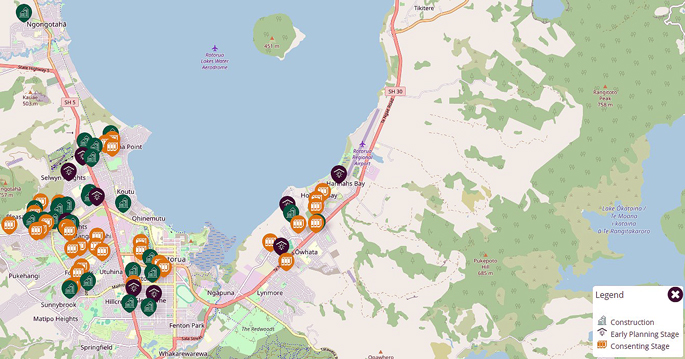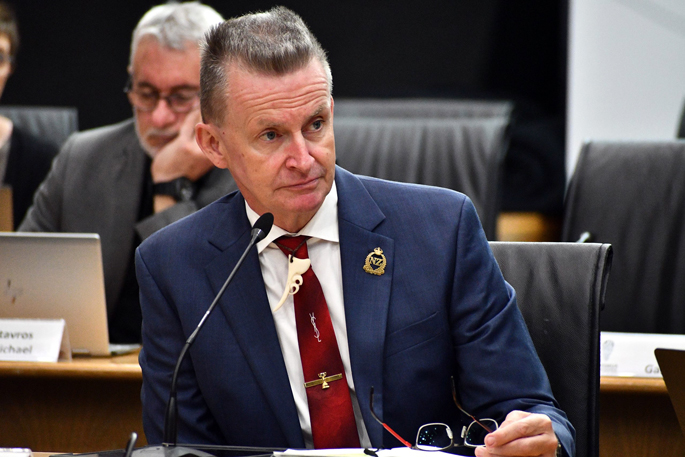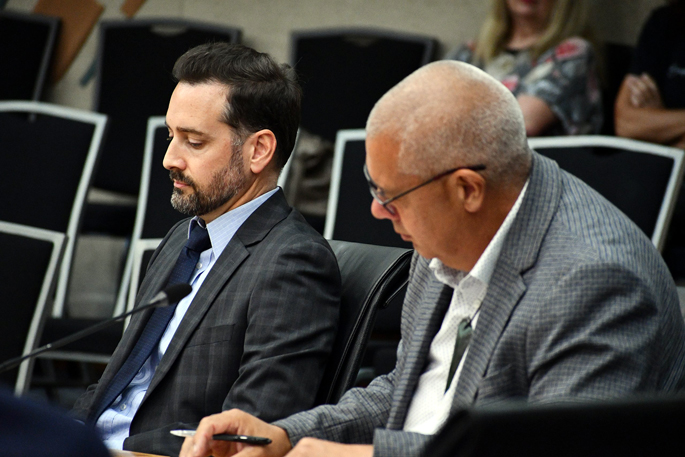There is “no robust evidence” Kāinga Ora activities impact house prices in surrounding areas, a leader in the state housing agency says.
But a Rotorua councillor disagrees, referencing locals’ “terrible, sad and upsetting stories” and offering to arrange for property experts to take the agency “through the evidence”.
The exchange came as representatives of the country’s biggest landlord addressed Rotorua Lakes Council’s Community and District Development Committee on Wednesday.
Kāinga Ora had about 900 homes in Rotorua and is making a major push to build more with 500 homes in the pipeline for 2024/25 – two-thirds of those new builds.
The scale of the building programme had some residents fearing Rotorua becoming the “social housing capital of New Zealand”, councillor Don Paterson said.
Kāinga Ora deputy chief executive, Central, Daniel Soughtton told the meeting a lower proportion (about 2.5 per cent) of Rotorua’s housing was publicly owned compared to the national average of 4 per cent.
“The large build you are seeing right now in your community is helping this community catch up to where other places are.”
 Planned and being constructed Kāinga Ora properties in Rotorua. Orange projects are the consenting stage, green are being constructed and black are in the early planning stage. Graphic / Kāinga Ora.
Planned and being constructed Kāinga Ora properties in Rotorua. Orange projects are the consenting stage, green are being constructed and black are in the early planning stage. Graphic / Kāinga Ora.
He also said there was “no robust evidence” Kāinga Ora activity impacted the housing market “in terms of prices”.
“There is actually a positive effect. Where we have been upgrading and growing our housing as part of the Canterbury recovery following the earthquake, the surrounding areas actually did better in terms of property prices compared to those that didn’t have that level of investment.”
Councillor Conan O’Brien said the robust evidence councillors had was from living in Rotorua.
“We accept the emails, we listen to our constituents, we get the phone calls. We listen to some very terrible, sad and upsetting stories by people affected by some of the things you are not directly responsible for, I respect that. Personal behaviour is personal responsibility.”
O’Brien said he would be happy to organise a meeting for Kāinga Ora to hear from local real estate agents and rental agencies to talk them “through the evidence”.
“I hope that would be robust enough for you.”
Zero forced evictions
Kāinga Ora Bay of Plenty regional director Darren Toy said in the last six months 38 households in Rotorua had been “causing us a bit of grief”.
Complaints varied from noise issues, property care and disruptive behaviour. Toy said most were resolved with communication and formal meetings while more serious issues followed the Residential Tenancies Act process.
He said it was “actively issuing breach notices” but had not forced any evictions from Kāinga Ora or other properties in the past two years.
“We have had some moved on after discussions with them,” Toy said. “Without having to formally evict them.”
O’Brien said he believed some people impacted poor Kāinga Ora tenant behaviour no longer complained to the council because they were “numb” to the issues.
$240m investment
Toy said the agency would invest $240 million in Rotorua in the 2024/25 year.
“We are targeting locals. Local subcontractors, local builders, local suppliers.”
There were no confirmed housing growth plans past that year until the Government-commissioned independent review of Kāinga Ora was complete.
This was expected by the end of the month.
Given the number of projects happening in Rotorua, it was taking a city-wide approach to community engagement rather than project-by-project.
A map of all developments in the city could be viewed on its website.
Paterson, who instigated inviting the agency to the meeting, said he believed the number of builds contributed to a community perception.
 Rotorua Lakes Councillor Don Paterson. Photo / Laura Smith.
Rotorua Lakes Councillor Don Paterson. Photo / Laura Smith.
“The whole rationale behind this [meeting] was to try and put these perceptions behind us so we can move on … a fair amount of [the perceptions] are just, because of what they have gone through.”
“People think the only building that is going on here is community housing … they are worried we are being turned into, the term that is being bandied about, the social housing capital of New Zealand.”
Paterson said while this was unfair, that was the perception.
Council district development general manager Jean-Paul Gaston about half the consents coming to council were for government-assisted builds.
He said bringing the city up to the national average of public housing was “quite important”.
Rotorua had about 1.5 per cent of the country’s population, 2.5 per cent of beneficiaries and 3.3 per cent of the housing register.
Rotorua’s higher unemployment and socioeconomic positioning drove housing need, he said.
By the numbers: Rotorua public housing
- 2.5 per cent: Public housing in Rotorua housing stock, compared to about 4 per cent nationally
- About 950 households are on the Ministry of Social Development register, 250 in emergency housing
- 200 on the register were 55 or older
- 150 homes tenanted since July 2022, most from coming motels and temporary housing - family groups prioritised
- 130 homes built since June 2022
- 12 vacant Kāinga Ora homes
- 500 houses in the pipeline for 2024/2025. Of these, 332 were new builds and the rest existing stock renewals
- $240 million: Total planned Kāinga Orainvestment in 2024/2025 year.
Source: Kāinga Ora
LDR is local body journalism co-funded by RNZ and NZ On Air.




4 comments
Th eMaster
Posted on 14-03-2024 12:27 | By Ian Stevenson
KO has a massive impact on the market place, they have no economic basis to exist, they have endless Govt monies to funds any and all silliness across he board.
That alone distorts the market place in so many ways... the KO denial is simply self preservation, nothing more. KO sucks up and consumes massive amounts of resources and over pays/inefficient with it all. KO is a "dream-machine" at best. The outcomes are so few and so costly.
Better to shut it down permanently and instead sort out properly the RMA so as prompt, efficient and cost effective outcomes are achieved. It is the only answer.
However that would mean KO ends ASAP, they themselves are never going to support or admit that as being the obvious answer.
The Master
Posted on 14-03-2024 17:17 | By Ian Stevenson
Any KO rep will obvious think that all they do is perfect, hence the self benefiting responses to Rotorua Council was an obvious response, not necessarily factual.
With KO have endless Govt money, staff and so on, to spend any/all anywhere they will obviously have a massive impact on the market place. With money to throw around 24/7 they will outbid anyone else as cost is not an issue to them.
That obviously pushes up the demand and so cost of everything.
Social Housing
Posted on 15-03-2024 05:14 | By Thats Nice
Of course, it has an impact in more ways than one. I'd be selling up real fast if I heard that social housing was being built right next door to me.
stupid ministry
Posted on 15-03-2024 07:40 | By Howbradseesit
Of course their houses undermine the value of the neighbourhood. I live near 3, soon to be 5 Kainga Ora homes. The lawns are unmown, the yard is scruffy and strewn with debris and the homes look like no one has pride in them. I'm not aware of noise or other antisocial behaviours because I don't live that close to them but I've often seen feral looking people congregating. Who would honestly want to live next to that? And kainga Ora doesn't think that feeling translates to a sale price???? Easier for that bunch of muppets to stick their heads in the sand and pretend that their housing stock isn't riddled with ferals that dont deserve to be in otherwise good neighbourhoods.
Leave a Comment
You must be logged in to make a comment.